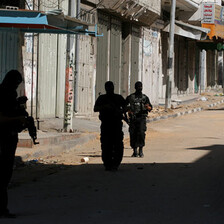The Electronic Intifada 12 March 2008

Palestinian patients waiting at Erez Crossing to enter Israel for medical treatment, October 2007. (Mahmoud Daher/IRIN)
JERUSALEM/GAZA, 12 March 2008 (IRIN) - Egypt has allowed over 200 Palestinian patients from the Gaza Strip to make their way into Egypt via the Rafah border crossing, according to Palestinian health officials.
After the large-scale Israeli incursion into Jabalya refugee camp at the end of February and beginning of March, which killed about 120 and caused many injuries, Egypt allowed some of the wounded to enter its territory through Rafah. A Palestinian health official in Gaza told IRIN over 230 people had crossed since then.
Hospitals and health centers in Gaza have been under severe strain for many months because of Israeli restrictions on fuel and other imports.
The Rafah crossing has been shut since 9 June 2007, shortly before the Islamist group Hamas’s takeover of Gaza. In January, the entire border area was breached by Palestinian militants for a few days.
Meanwhile, according to national and international media reports, behind-the-scenes negotiations are continuing between Israel, Egypt, Hamas and Fatah over a ceasefire in the Gaza Strip. Palestinian President Abbas has said, on Al-Arabiyah TV for example, that Hamas and Israel are very close to reaching a deal.
Israel continues to grant some patients permission to leave Gaza via the Erez crossing in the northern part of the enclave, but many, especially those with “security” problems, remain stuck inside. Militants wounded during fighting with Israel have a particularly tough time receiving Israeli permission to leave Gaza, medical officials said.
Deal struck?
Hamas said it struck a deal with Egypt and set criteria for who would be allowed out: those wounded by the Israeli military, cardiac patients in need of surgery and cancer patients heading for chemotherapy.
However, Fatah Health Ministry officials said it was their own leaders who reached the agreement with Egypt.
An official involved in the practical side of the transfers told IRIN that the authorities in Gaza and Fatah-controlled Ramallah in the West Bank cooperated to get the patients through. He noted that on 11 March movement stopped, as Egypt expressed certain reservations, but he hoped that within a few days patients would again be able to enter Egypt.
A senior aid worker for an international organization working in Gaza said it was Egypt which initiated the transfers, possibly to garner respect among the Palestinians and Arabs in general.
While the ceasefire deal in Gaza remains somewhat clouded - with leaks and counter-leaks to the media combined with statements and counter-statements by leaders of the various sides - Israel for now was relaxed about the new situation at Rafah, according to a senior Israeli security official.
“We are aware that the border has been opened for some patients,” the official told IRIN, indicating there were no plans to intervene for the moment.
Similarly, observers noted that Israel and militant groups in Gaza had scaled back their activity: The past few days, since a shooting attack in Jerusalem by a Palestinian man killed eight Israelis, have been almost without incident.
On 12 March 22 development organizations, including Oxfam and World Vision, called on the Quartet (the USA, the European Union, Russia and UN) and the Arab League to broker a ceasefire in Gaza and work to improve movement in and out of the Strip.
This item comes to you via IRIN, a UN humanitarian news and information service, but may not necessarily reflect the views of the United Nations or its agencies. All IRIN material may be reposted or reprinted free-of-charge; refer to the copyright page for conditions of use. IRIN is a project of the UN Office for the Coordination of Humanitarian Affairs.
Related Links


